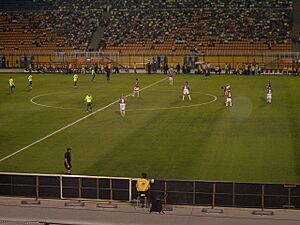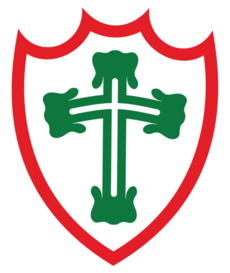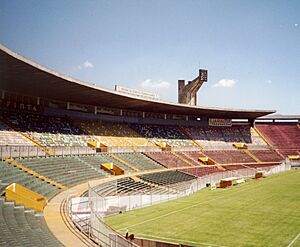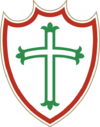Associação Portuguesa de Desportos facts for kids

Associação Portuguesa de Desportos, often called Portuguesa or Lusa, is a professional football club from São Paulo, Brazil. The club plays in the Campeonato Paulista, which is the top football league in the São Paulo state. They also compete in the Campeonato Brasileiro Série D, a national league. Portuguesa is part of a larger sports club and was started on August 14, 1920. It was founded by the Portuguese community living in São Paulo.
Contents
Club History
How Portuguesa Started
On August 14, 1920, five football clubs from São Paulo that represented the Portuguese community decided to join together. These clubs were Lusíadas Futebol Club, Portugal Marinhense, Associação Cinco de Outubro, Associação Atlética Marquês de Pombal, and Esporte Club Lusitano. They met and formed a new club called Associação Portuguesa de Esportes. They chose the colors green and red, which are the colors of Portugal. Later in 1920, the club merged with Mackenzie College and was briefly known as Mackenzie-Portuguesa.
The 1940s and 1950s
In 1940, the club changed its name to Associação Portuguesa de Desportos, which is its name today. In 1956, Portuguesa bought a large piece of land from São Paulo FC. On this land, they built their home stadium, the Canindé, along with their main offices and social club.
Recent Years in Football
2011: A Big Win
In 2011, Portuguesa played in the São Paulo State Championship and the Campeonato Brasileiro Série B (Brazil's second division). On October 22, 2011, after a great comeback win, the club earned a spot in the Campeonato Brasileiro Série A for 2012.
On November 8, they tied a game 2–2 against Sport Recife. This draw meant Portuguesa won the 2011 Série B title. It was the first time the club won a national championship! They had a very strong season with 23 wins, 12 draws, and only three losses. Their coach, Jorginho, made the team play an attacking and fast style. They scored 82 goals, which led fans to call them "Barcelusa," like the famous FC Barcelona team. Portuguesa ended the 2011 season with a 2–0 win and went 21 games without losing.
2012: Ups and Downs
After their great 2011 season, the "Barcelusa" team had a tough start in 2012. They lost some key players and were moved down to a lower division in the Campeonato Paulista. Because of this, their coach Jorginho left the team.
Later, Geninho became the new coach. The team played well in the Copa do Brasil but lost in the Round of 16. Portuguesa also signed Dida, a famous goalkeeper who had won the UEFA Champions League twice. Dida played his first game for Portuguesa against São Paulo and helped them win 1–0. He also made amazing saves in a 0–0 draw against Neymar's Santos.
The team also got a new striker, Bruno Mineiro, who scored many goals. He became one of the top scorers in the league. Portuguesa played tough games against big teams like Fluminense, São Paulo, Santos, and Atlético Mineiro. They even beat Santos away from home. Bruno Mineiro scored three goals in a 5–1 win against Sport Club do Recife, making him the league's top scorer for a while.
2013: Promotion and Relegation
In December 2012, Péricles Chamusca became the new head coach, but he was fired in April 2013. Portuguesa then got promoted back to the top division of the Campeonato Paulista after beating Capivariano 2–1.
However, Portuguesa faced a big problem. They were punished by the sports court for using a player, Héverton, who was supposed to be suspended. Because of this, the team lost four points. This caused them to drop into the relegation zone and be moved down to the second division, while other teams like Fluminense and Flamengo stayed up.
2014: More Challenges
In 2014, Portuguesa had a difficult year. They struggled in the 2014 Campeonato Paulista and changed coaches several times. They were also knocked out of the Copa do Brasil early.
Later in the year, Portuguesa was moved down to Série C (Brazil's third division) for the first time in their history. This happened after they lost 0–3 to Oeste on October 28.
2015–2016: Further Divisions
Portuguesa started the 2015 Paulistão with a win. They also reached the second round of the Copa do Brasil. However, in March 2015, the club's president resigned. Two weeks later, Portuguesa was moved down to the Série A2 of the state league.
In the Série C that year, Portuguesa played well enough to reach the final rounds but did not get promoted. The next year, they barely avoided being moved down again in the Série A2.
At the end of the 2016 season, Portuguesa was moved down again, this time to Série D (Brazil's fourth division).
2017–2024: Copa Paulista Title
After 2016, Portuguesa was not in any national division for the 2018 season. They played in state leagues and the Copa Paulista. They had several different coaches during these years.
In 2020, Fernando Marchiori became the coach and led the club to win the Copa Paulista for the first time ever! They only lost one match in the whole competition. This win meant Portuguesa would play in a national tournament again after three years.
In 2022, under coach Sérgio Soares, Lusa earned promotion back to the Campeonato Paulista after seven years. In 2023, they managed to avoid relegation in the state championship. They also introduced a new third kit inspired by the Rooster of Barcelos, a popular Portuguese symbol.
In 2024, Portuguesa reached the quarterfinals of the Paulistão for the first time in 13 years, but they lost to Santos.
2025: New Plans
On November 7, 2024, a group of investors offered to buy 80% of the club's new project, called Sociedade Anônima do Futebol (SAF). This plan included investing R$1 billion (Brazilian currency) to pay off the club's debts and build a new stadium where the Estádio do Canindé currently stands. The club's council approved this offer a week later.
Club Achievements
Official Tournaments
| National | ||
|---|---|---|
| Competitions | Titles | Seasons |
| Campeonato Brasileiro Série B | 1 | 2011 |
| Inter-state | ||
| Competitions | Titles | Seasons |
| Torneio Rio–São Paulo | 2 | 1952, 1955 |
| State | ||
| Competitions | Titles | Seasons |
| Campeonato Paulista | 3 | 1935, 1936, 1973 |
| Copa Paulista | 1 | 2020 |
| Campeonato Paulista Série A2 | 3 | 2007, 2013, 2022 |
Other Wins
International
- San Izidro Cup (1): 1951
- Bogota Quadrangular Tournament (1): 1953
- Istanbul Quadrangular Tournament (1): 1972
- Torneio Internacional do Estádio do Canindé (1): 1981
- Torneio Madeira Autonomia (1): 1988
National
- Torneio Quadrangular de Salvador (1): 1951
- Torneio Quadrangular de Belo Horizonte (1): 1951
- Torneio Folha de Londrina (1): 1956
State
- Taça Cidade de São Paulo (1): 1973
- Taça Governador do Estado de São Paulo (1): 1976
- Taça Piratininga (1): 1964
- Torneio Início (3): 1935, 1947, 1996
Second Place Finishes
- Campeonato Brasileiro Série A (1): 1996
- Campeonato Paulista (4): 1940, 1960, 1975, 1985
Youth Team Wins
- Copa São Paulo de Futebol Júnior (2): 1991, 2002
Special Awards
- Fita Azul (3): 1951, 1953, 1954
The Fita Azul (Blue Ribbon) was an award given to clubs that had successful trips playing games outside of Brazil.
Women's Football
- Campeonato Brasileiro de Futebol Feminino (1): 1999-2000
- Campeonato Paulista de Futebol Feminino (2): 1998, 2000
Main Rivals
Portuguesa has played many important matches against other big clubs. Their main rivals include Corinthians, Palmeiras, São Paulo, and Juventus.
Home Stadium
Portuguesa's home stadium is the Estádio do Canindé. It was built in 1956. The stadium can hold up to 22,004 people for games.
Club Logo History
The club's first logo was a Portuguese shield, chosen on August 14, 1920, to honor Portugal.
In 1923, a new logo was introduced. It featured a Cross of Avis with a red border. The Cross of Avis is a symbol of Portugal's independence.
In 2005, the club's logo was updated with a more modern look and a golden trim.
In 2015, Portuguesa decided to go back to the older logo design that was used between 1923 and 2005.
Team Colors
|
|
|
|
Portuguesa's first uniform, introduced on September 20, 1920, was an all-red shirt, white shorts, and red socks with two green lines. The goalkeeper's uniform was completely white.
On March 26, 1923, the club's uniform changed to shirts with red and green vertical stripes.
Later, the team's uniform changed again. The red and green stripes became horizontal. The away uniform became an all-white shirt with red shorts and red socks.
Club Mascots
Portuguesa's first mascot was a Portuguese girl named Severa. She was named after a famous fado singer from the 1930s.
In 1994, Portuguesa changed its mascot to a lion wearing the club's home uniform. The lion is a common mascot for many Brazilian football clubs.
Club Anthems
Portuguesa has two club anthems. The first one is called Hino Rubro-verde (which means Red and Green Anthem in Portuguese). It was composed by Archimedes Messina and Carlos Leite Guerra.
The second and current anthem is called Campeões (meaning Champions in Portuguese). It was composed by Roberto Leal and Márcia Lúcia.
See also
 In Spanish: Associação Portuguesa de Desportos para niños
In Spanish: Associação Portuguesa de Desportos para niños
 | Bessie Coleman |
 | Spann Watson |
 | Jill E. Brown |
 | Sherman W. White |




